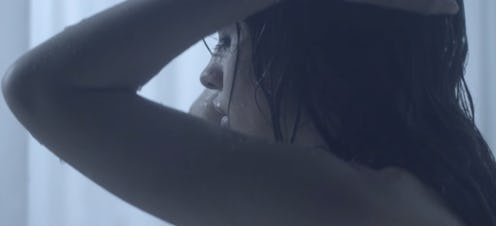Entertainment
Camila Cabello's Debut Solo Song Is Finally Here

If you've been missing Camila Cabello after her departure from Fifth Harmony at the end of last year, I have something that might made you shed tears of joy. After a round of collaborations, the singer has released her official debut single off The Hurting, the Healing, the Loving, "Crying In The Club." Now, some of you may be wondering what the "Crying In The Club" lyrics are about. And I must admit that I have to side-eye you a bit here, because it's obviously about... crying in the club aka a normal Friday for me. But if you need me to paint a more vivid narrative, we can go into the lyrics piece by piece.
In the first verse, Cabello seems to be singing to someone who has recently lost their boyrfriend (or guy they like) and is handling it, eh, a little bit poorly. "You think, that you'll die without him/You know, that's a lie that you tell yourself," she sings. The person she's singing to is having a real rough time, but she's there to comfort them by saying even if they think they'll be alone forever, "It ain't true."
The pre-chorus has Cabello literally supporting her friend by instructing them to, "put your arms around me tonight" and "let the music lift you up/like you've never been so high." She wants her friends to dance off the pain, but she also urges them to "open up your heart to me," and presumably share those feelings if they want to. And then she gets to her point, which is that there "ain't no crying in the club" and "let the beat carry, your tears as they fall baby."
It is, in essence, just words of comfort while her friend is going through a rough time and probably sloppy-sobbing (which I mean, hey, been there).
The second verse is a lot more of the same but with an interesting twist: a change in pronouns. "You may think, that you'll die without her/But you know, that's a lie that you told yourself/You fear, that you'll never meet another so pure," she sings, and yet again, "it ain't true." What I like about this almost imperceptible change is how it promotes inclusivity without making a grandiose statement on it. Is the person Cabello singing to a woman? Is it a sensitive young man? Or is she simply trying to sing to every person in her audience, recognizing that hurt is universal?
What's clear is that there's certainly going to be a lot of hurting, healing, and loving in Cabello's upcoming album. Hopefully, the song will tide you over until then.